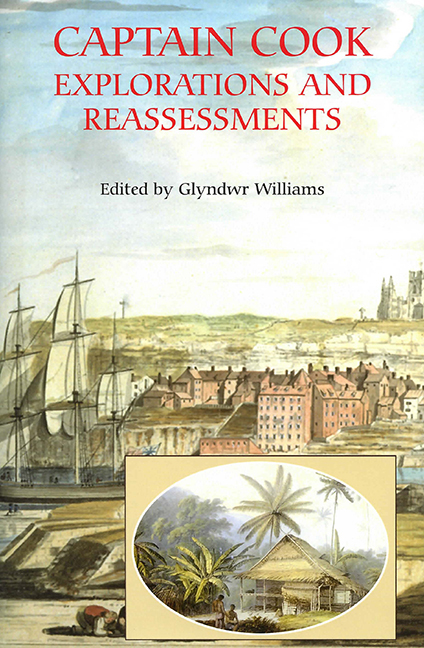Introduction
Published online by Cambridge University Press: 25 October 2017
Summary
The conference on ‘Captain Cook: Explorations and Reassessments’ held at the University of Teesside, Middlesbrough, on 11–14 September 2002, was the sixth International Conference sponsored by the Arts and Humanities Research Board Centre for North-East England History. In one way it was an appropriate commemoration of local allegiances, for James Cook was born at Marton-in-Cleveland, only five miles from the conference hall, and his earliest experience of the sea and ships was at Whitby, less than thirty miles away. In another way the conference represented world history, for as with any meeting on Cook and his voyages the subject-matter of many of the papers concerned the Pacific. This association between the local and the global, between the Yorkshire background of the young Cook, and the ocean crisscrossed by the famous navigator, was a prominent feature of the conference. It was held at a time when Cook continued to attract both scholarly and popular attention. In those countries of the Pacific visited by Cook the current debate tends to concentrate on the larger implications of Cook's voyages, and the extent to which the individual explorer could be held responsible for the actions of his successors. In Britain there is perhaps less questioning of Cook's role and more celebration of his achievements. A six-part BBC 2 television series on Cook's first Pacific voyage was shown just before the conference began; in the weeks immediately after the conference Radio 4 broadcast a three-part series on Cook's voyages. The full-size replica of the Endeavour had reached Britain earlier in the year, while the summer months saw the publication of several books on Cook and his voyages. It was, then, a timely moment for a conference whose aim was to assess the present standing of Captain Cook as one of the leading figures in eighteenth-century history.
The chapters presented in this volume represent a range of disciplines and approaches. They have been grouped into four sections. Part I, ‘The Years in England’, opens with Rosalin Barker's chapter describing Whitby in the eighteenth century, and the environment that helped to provide the young James Cook with a good scientific and mathematical education as well as a practical training in seamanship. Richard Allen follows this by investigating the implications of Cook's apprenticeship with the Quaker shipowners, John and Henry Walker.
Information
- Type
- Chapter
- Information
- Captain CookExplorations and Reassessments, pp. 1 - 4Publisher: Boydell & BrewerPrint publication year: 2004
